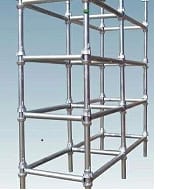Nithya Scaff
Nithya Scaff, Kottappuram Road, Near Thalikalamuri Auditorium, Aroor, Alappuzha, 688534
Since : 2022
Nithya Scaff, Kottappuram Road, Near Thalikalamuri Auditorium, Aroor, Alappuzha, 688534
Since : 2022
Wall formworks are crucial components in the construction process, especially when building concrete walls for residential, commercial, or industrial projects. The primary function of wall formworks is to create a stable mold for pouring concrete, ensuring that it sets correctly and supports the desired structure once hardened. These formworks are typically made from materials like plywood, steel, or aluminum, depending on the needs and requirements of the project.
In Alappuzha, wall formwork services are widely available, catering to various construction projects. Whether it's for high-rise buildings, residential complexes, or infrastructure projects, wall formwork solutions are integral to ensuring precise, strong, and durable walls. As demand for construction projects continues to grow in the region, more companies are specializing in providing high-quality formwork solutions to meet the specific needs of the construction industry. Wall formwork refers to the temporary structure or mold used to shape concrete walls during construction. These molds are typically created from materials that can withstand the pressure exerted by the poured concrete until it sets and hardens. Wall formwork is designed to ensure that the final wall structure is strong, precise, and durable. Depending on the type of project, wall formwork can be made from plywood, steel, aluminum, or plastic, each material offering specific advantages based on the construction requirements.
Nithya
Scaff
Alappuzha
Formworks
Kochi
Formwork Solutions
VJ
Scaffolding & Formwork
Prime
Formwork Solutions
All
Kerala Formwork Services
Aiswarya
Formwork
Alappuzha
Scaffoldings
Southern
Formworks
Sunlight
Scaffolding & Formwork
Form manufacturers play a crucial role in the
construction industry by producing high-quality formwork systems that serve as
molds for shaping concrete structures. Formwork is essential in ensuring the
structural integrity and precision of walls, columns, slabs, and other concrete
components. It provides temporary support until the concrete hardens and can
sustain its weight. Modern formwork systems are designed to be reusable,
durable, and easy to install, making them indispensable in fast-paced construction
projects.
Wall Formwork
refers to the temporary molds or structures used to shape and hold wet concrete
in place while it cures and hardens to form vertical walls. Wall formwork
systems are crucial in construction, especially in projects involving the
construction of concrete walls for buildings, bridges, dams, and other
structures.
Components of Wall Formwork:
Types of Wall Formwork Systems:
Advantages of Wall Formwork:
Wall Form Manufacturers are companies that specialize
in producing wall formwork systems used in the construction industry. These
wall forms are crucial for shaping and supporting concrete walls while they set
and harden. Wall forms are typically used in the construction of buildings,
bridges, tunnels, dams, and other large structures requiring durable,
high-quality concrete walls.
What Wall Form Manufacturers Do:
Types of Wall Forms Provided by
Manufacturers:
Key Advantages of Using Wall Forms from
Manufacturers:
Q1: What is wall formwork, and why is it
important in construction?
A1: Wall formwork is a temporary mold used to shape and support vertical
concrete structures like walls and columns. It is essential in construction
because it ensures that the concrete takes the correct shape, aligns properly,
and achieves the required strength for structural integrity.
Q2: What materials are commonly used in
wall formwork systems?
A2: Wall formwork systems are made from a variety of materials,
including steel, aluminum, timber, and plastic.
Steel and aluminum are preferred for their durability and reusability, while
timber is often used for smaller, less demanding projects.
Q3: Why is reusability an important factor
in choosing wall formwork?
A3: Reusability reduces construction costs in the long run. Modern wall
formwork systems can be used multiple times, which minimizes the need to
purchase new materials for each project. It also contributes to sustainability
by reducing waste.
Q4: What are the advantages of using
modular wall formwork systems?
A4: Modular wall formwork systems are easy to assemble, disassemble, and
transport. They offer flexibility in terms of wall height and thickness, making
them adaptable to different project needs. Additionally, modular systems are
reusable, saving both time and costs for construction companies.
Q5: How do wall form manufacturers ensure
precision and quality in their products?
A5: Wall form manufacturers use advanced CNC machining and design
software to create precision-engineered formwork systems. This ensures that
the formworks are dimensionally accurate and produce smooth, well-aligned
concrete surfaces.
Q6: Can wall formwork be customized for
specific projects?
A6: Yes, many wall form manufacturers offer custom solutions
tailored to the specific requirements of a project. This is especially useful
for projects with unique designs, such as curved walls, sloped surfaces, or
non-standard shapes.
Q7: What factors should I consider when
choosing a wall formwork system?
A7: When choosing a wall formwork system, consider factors such as load-bearing
capacity, ease of assembly, material durability, reusability,
and surface finish quality. The type of project, budget, and
environmental conditions also play a significant role in selecting the
appropriate formwork system.
Q8: How can I find a reliable wall form
manufacturer for my project?
A8: To find a reliable wall form manufacturer, research companies with
experience in producing high-quality formwork systems. Look for manufacturers
with positive customer reviews, advanced production capabilities, and a wide
range of products. Consulting with construction professionals and requesting
product samples can also help you make an informed decision.

Alappuzha, Aroor

Alappuzha, Aroor